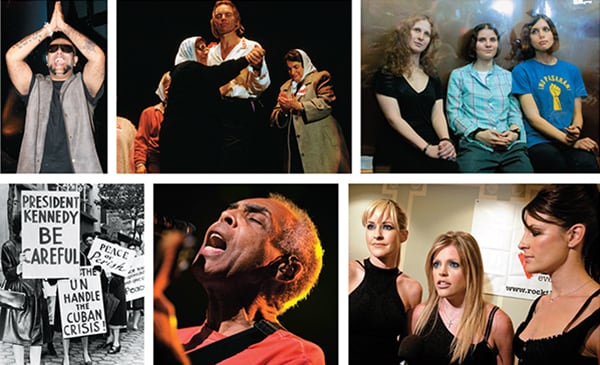Celebrity activists or quacktivists?
What happens when musicians leap from the mosh pit to the pulpit


When john Fogerty appeared during David Letterman’s final run as America’s longest-running late-night TV talk show host, the gravel-voiced songster pulled out a triad of his classics. He began the medley with ‘Travelin’ Band’, a song that in my childhood wore down my 45rpm record from rampant overplay, moved on to ‘Proud Mary’, then, most significantly, topped it all with a fusillade from his political protestation ‘Fortunate Son’.
Musicians as political objectors and social commentators are no novelty in the modern world. Listeners aren’t just used to them protesting through songs, they’ve long celebrated it. When, in 1945, Woody Guthrie sang ‘This Land Is Your Land’, his rejoinder to Irving Berlin’s saccharine anthem ‘God Bless America’, it was par for the contrarian course. Bob Dylan’s anti-war ‘A Hard Rain’s A-Gonna Fall’, whose release coincided with the American debacle known as the Cuban missile crisis, was but one offering from a vast repertoire of socio-political disagreement and fulmination. John Lennon’s appeals to make love, not war, resonated with folks across the globe, who took solace in the pipedream, imagining a world that could “live as one”. The Woodstock music festival played kickstarter to a whole era of socially conscious rock ’n’ roll, with bands wailing about injustices over the scorch of distorted guitars.
Dissent is acceptable when set in song (who doesn’t love a good rant over a slamming groove?) as is celebrity musicians allying with pet causes. The fans see their idols as morally engaged, the lustre rubbing off via the backwash of devotion. But what happens when musicians leap from the mosh pit to the pulpit? Does a rockstar have greater cogency than the average Joglekar? Is Bono blessed with a bigger conscience than his fans? Does Vishal Dadlani have deeper insight into national politics than a B-wood devotee? What gives Brit band Coldplay’s English frontman Chris Martin the credibility to shill for US presidential candidates, as he did twice—in 2004 for Democratic candidate John Kerry, then in 2008 for imminent POTUS Barack Obama?
American country superstars Dixie Chicks learnt the hard way that disagreement from the dais can rebound with disastrous consequence. When their singer Natalie Maines expressed her disenchantment with George W Bush at a London concert in 2003, stating she was “ashamed the president of the United States is from Texas”, a vast network of radio stations owned by the right-wing-supporting corporation Clear Channel blacklisted the Dixies from all airplay across the US—they decided that the singer’s ‘blasphemous’ opinion warranted a blanket embargo on the band’s music.

Sound and fury: (Clockwise from top) Vishal Dadlani Sting with Chilean mothers Russian punk rockers Pussy Riot Dixie Chicks Brazilian singer-songwriter Gilberto Gil protests during the Cuban missile crisis, a cause taken up by the likes of Bob Dylan
It could be argued that musicians, particularly songwriters, by virtue of being observers of human behaviour, in the wider world as well as within their own inner space, possess some additional credentials for social activism. When Sting released ‘They Dance Alone’, from his landmark album Nothing Like the Sun, he was able to alert the whole world to the plight of Chilean mothers, wives and sisters thousands of kilometres away, mourning the loss of their loved ones “disappeared” at the hands of Augusto Pinochet’s murderous regime. The last song Bob Marley ever played on stage, ‘Get Up, Stand Up’, continues to resonate with oppressed people across the world, not just the Haitians for whom Marley originally wrote the song. Nigeria’s Fela Kuti instigated people not just to dance to the incredibly groovy Afrobeat sound that he invented, but also to pay heed to his calls for social and human rights reform.
But political opposition by musicians isn’t tolerated equally, as Russian punk rockers Pussy Riot discovered in 2012. A couple of the rebel girls were sentenced to two years’ imprisonment for hooliganism, a veil for their open defiance of Vladimir Putin’s dictatorial ways. Some musicians go well beyond outcry. Peter Garrett, frontman of the Australian rock band Midnight Oil, best known for the chart-topping conscience rouser ‘Beds Are Burning’ from their indigenous-rights-themed album Diesel and Dust, made the big leap from performing artiste to political representative. A member of the Australian Labor Party, Garrett was appointed minister for the environment, heritage and the arts in 2007 by then PM Kevin Rudd. Another famous muso-turned-politico was the eminent Brazilian singer-songwriter Gilberto Gil, who served a five-year term as that country’s minister for culture.
But not all players are possessed of the liberality one would expect of a person who engages in such a onsciousness-expanding act as making music. The rabble-rousing American guitar player Ted Nugent, performer of the 1970s hits ‘Cat Scratch Fever’ and ‘Wango Tango’, is a regular spewer of extreme right-wing political views. The one-time member of the supergroup Damn Yankees regularly campaigns against gun control, pitches on behalf of Republican politicians and is outspoken in his contempt for animal rights.
In India, musicians going political is a rare occurrence. But Vishal Dadlani, frontman of the now-defunct rock band Pentagram and one half of the Bollywood duo Vishal-Shekhar, is unapologetically vocal about his support for the reformist Aam Aadmi Party. Paying heed to his own words, from ‘Voice’ by Pentagram, “There are words that must be said / And there are words that must be heard / And that they’re not as really quite absurd / I need a voice now.”
The author is the lead singer of Indus Creed
First Published: Aug 15, 2015, 07:42
Subscribe Now(This story appears in the Jul 16, 2010 issue of Forbes India. To visit our Archives, Click here.)